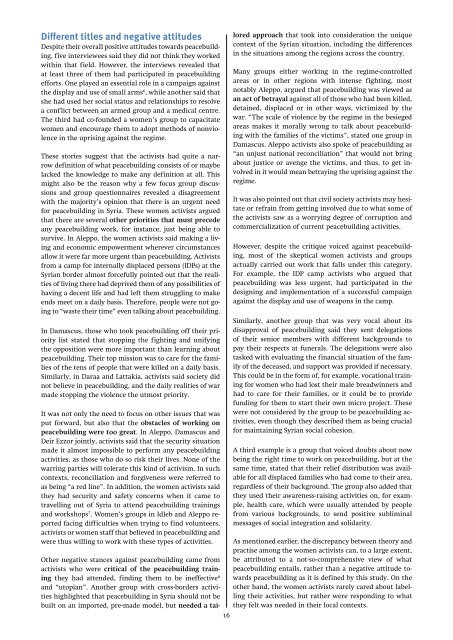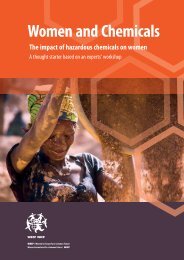future now”
YAO19
YAO19
Create successful ePaper yourself
Turn your PDF publications into a flip-book with our unique Google optimized e-Paper software.
Different titles and negative attitudes<br />
Despite their overall positive attitudes towards peacebuilding,<br />
five interviewees said they did not think they worked<br />
within that field. However, the interviews revealed that<br />
at least three of them had participated in peacebuilding<br />
efforts. One played an essential role in a campaign against<br />
the display and use of small arms 6 , while another said that<br />
she had used her social status and relationships to resolve<br />
a conflict between an armed group and a medical centre.<br />
The third had co-founded a women’s group to capacitate<br />
women and encourage them to adopt methods of nonviolence<br />
in the uprising against the regime.<br />
These stories suggest that the activists had quite a narrow<br />
definition of what peacebuilding consists of or maybe<br />
lacked the knowledge to make any definition at all. This<br />
might also be the reason why a few focus group discussions<br />
and group questionnaires revealed a disagreement<br />
with the majority’s opinion that there is an urgent need<br />
for peacebuilding in Syria. These women activists argued<br />
that there are several other priorities that must precede<br />
any peacebuilding work, for instance, just being able to<br />
survive. In Aleppo, the women activists said making a living<br />
and economic empowerment wherever circumstances<br />
allow it were far more urgent than peacebuilding. Activists<br />
from a camp for internally displaced persons (IDPs) at the<br />
Syrian border almost forcefully pointed out that the realities<br />
of living there had deprived them of any possibilities of<br />
having a decent life and had left them struggling to make<br />
ends meet on a daily basis. Therefore, people were not going<br />
to “waste their time” even talking about peacebuilding.<br />
In Damascus, those who took peacebuilding off their priority<br />
list stated that stopping the fighting and unifying<br />
the opposition were more important than learning about<br />
peacebuilding. Their top mission was to care for the families<br />
of the tens of people that were killed on a daily basis.<br />
Similarly, in Daraa and Lattakia, activists said society did<br />
not believe in peacebuilding, and the daily realities of war<br />
made stopping the violence the utmost priority.<br />
It was not only the need to focus on other issues that was<br />
put forward, but also that the obstacles of working on<br />
peacebuilding were too great. In Aleppo, Damascus and<br />
Deir Ezzor jointly, activists said that the security situation<br />
made it almost impossible to perform any peacebuilding<br />
activities, as those who do so risk their lives. None of the<br />
warring parties will tolerate this kind of activism. In such<br />
contexts, reconciliation and forgiveness were referred to<br />
as being “a red line”. In addition, the women activists said<br />
they had security and safety concerns when it came to<br />
travelling out of Syria to attend peacebuilding trainings<br />
and workshops 7 . Women’s groups in Idleb and Aleppo reported<br />
facing difficulties when trying to find volunteers,<br />
activists or women staff that believed in peacebuilding and<br />
were thus willing to work with these types of activities.<br />
16<br />
Other negative stances against peacebuilding came from<br />
activists who were critical of the peacebuilding training<br />
they had attended, finding them to be ineffective 8<br />
and “utopian”. Another group with cross-borders activities<br />
highlighted that peacebuilding in Syria should not be<br />
built on an imported, pre-made model, but needed a tailored<br />
approach that took into consideration the unique<br />
context of the Syrian situation, including the differences<br />
in the situations among the regions across the country.<br />
Many groups either working in the regime-controlled<br />
areas or in other regions with intense fighting, most<br />
notably Aleppo, argued that peacebuilding was viewed as<br />
an act of betrayal against all of those who had been killed,<br />
detained, displaced or in other ways, victimized by the<br />
war. “The scale of violence by the regime in the besieged<br />
areas makes it morally wrong to talk about peacebuilding<br />
with the families of the victims”, stated one group in<br />
Damascus. Aleppo activists also spoke of peacebuilding as<br />
“an unjust national reconciliation” that would not bring<br />
about justice or avenge the victims, and thus, to get involved<br />
in it would mean betraying the uprising against the<br />
regime.<br />
It was also pointed out that civil society activists may hesitate<br />
or refrain from getting involved due to what some of<br />
the activists saw as a worrying degree of corruption and<br />
commercialization of current peacebuilding activities.<br />
However, despite the critique voiced against peacebuilding,<br />
most of the skeptical women activists and groups<br />
actually carried out work that falls under this category.<br />
For example, the IDP camp activists who argued that<br />
peacebuilding was less urgent, had participated in the<br />
designing and implementation of a successful campaign<br />
against the display and use of weapons in the camp.<br />
Similarly, another group that was very vocal about its<br />
disapproval of peacebuilding said they sent delegations<br />
of their senior members with different backgrounds to<br />
pay their respects at funerals. The delegations were also<br />
tasked with evaluating the financial situation of the family<br />
of the deceased, and support was provided if necessary.<br />
This could be in the form of, for example, vocational training<br />
for women who had lost their male breadwinners and<br />
had to care for their families, or it could be to provide<br />
funding for them to start their own micro project. These<br />
were not considered by the group to be peacebuilding activities,<br />
even though they described them as being crucial<br />
for maintaining Syrian social cohesion.<br />
A third example is a group that voiced doubts about now<br />
being the right time to work on peacebuilding, but at the<br />
same time, stated that their relief distribution was available<br />
for all displaced families who had come to their area,<br />
regardless of their background. The group also added that<br />
they used their awareness-raising activities on, for example,<br />
health care, which were usually attended by people<br />
from various backgrounds, to send positive subliminal<br />
messages of social integration and solidarity.<br />
As mentioned earlier, the discrepancy between theory and<br />
practise among the women activists can, to a large extent,<br />
be attributed to a not-so-comprehensive view of what<br />
peacebuilding entails, rather than a negative attitude towards<br />
peacebuilding as it is defined by this study. On the<br />
other hand, the women activists rarely cared about labelling<br />
their activities, but rather were responding to what<br />
they felt was needed in their local contexts.



